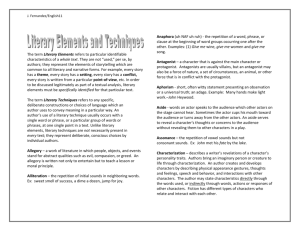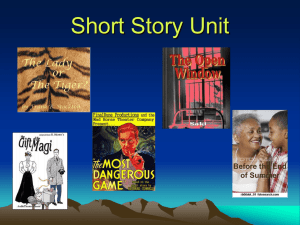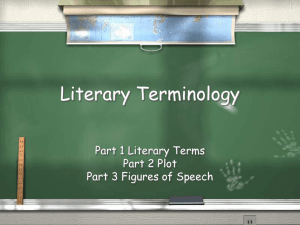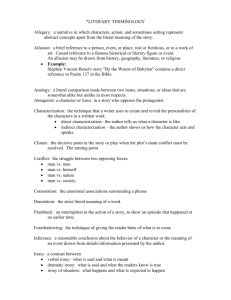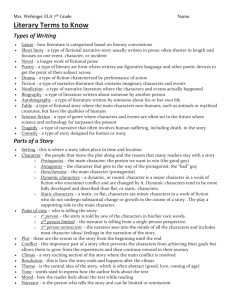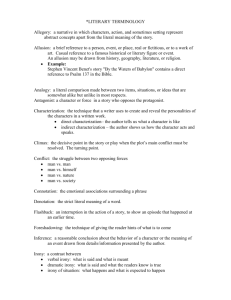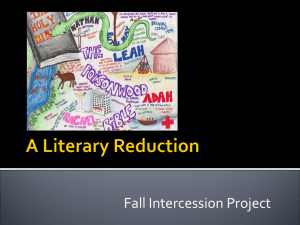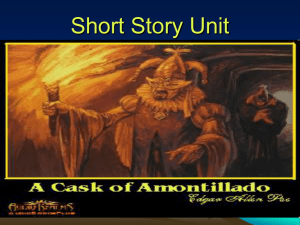Literary Terms
advertisement
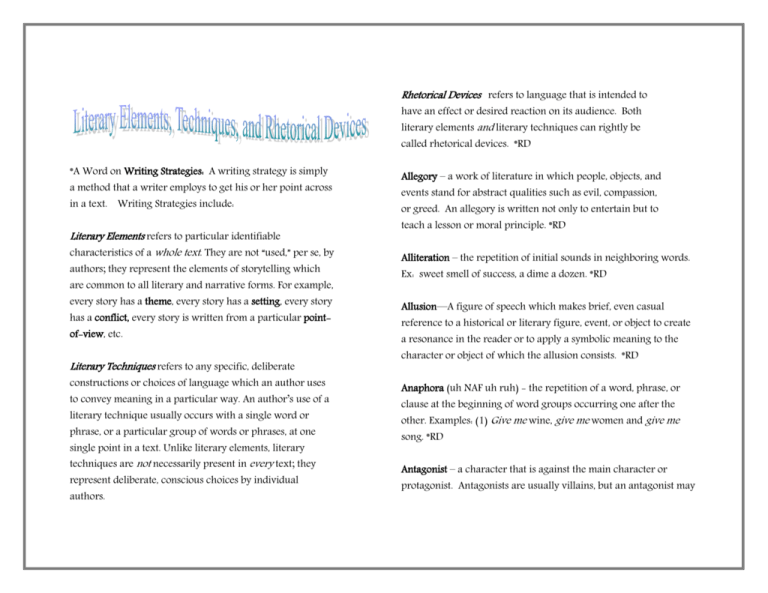
Rhetorical Devices refers to language that is intended to have an effect or desired reaction on its audience. Both literary elements and literary techniques can rightly be called rhetorical devices. *RD *A Word on Writing Strategies: A writing strategy is simply a method that a writer employs to get his or her point across in a text. Writing Strategies include: Literary Elements refers to particular identifiable characteristics of a whole text. They are not “used,” per se, by authors; they represent the elements of storytelling which are common to all literary and narrative forms. For example, every story has a theme, every story has a setting, every story has a conflict, every story is written from a particular pointof-view, etc. Literary Techniques refers to any specific, deliberate constructions or choices of language which an author uses to convey meaning in a particular way. An author’s use of a literary technique usually occurs with a single word or phrase, or a particular group of words or phrases, at one single point in a text. Unlike literary elements, literary techniques are not necessarily present in every text; they represent deliberate, conscious choices by individual authors. Allegory – a work of literature in which people, objects, and events stand for abstract qualities such as evil, compassion, or greed. An allegory is written not only to entertain but to teach a lesson or moral principle. *RD Alliteration – the repetition of initial sounds in neighboring words. Ex: sweet smell of success, a dime a dozen. *RD Allusion—A figure of speech which makes brief, even casual reference to a historical or literary figure, event, or object to create a resonance in the reader or to apply a symbolic meaning to the character or object of which the allusion consists. *RD Anaphora (uh NAF uh ruh) - the repetition of a word, phrase, or clause at the beginning of word groups occurring one after the other. Examples: (1) Give me wine, give me women and give me song. *RD Antagonist – a character that is against the main character or protagonist. Antagonists are usually villains, but an antagonist may also be a force of nature, a set of circumstances, an animal, or other force that is in conflict with the protagonist. Antihero—Protagonist of a literary work who does not embody the traditional qualities of a hero (e.g., honor, bravery, kindness.) Aphorism - short, often witty statement presenting an observation or a universal truth; an adage. Example: Many hands make light work.–John Heywood. *RD Aside - words an actor speaks to the audience which other actors to life through characterization. An author creates and develops characters by describing physical appearance gestures, thoughts and feelings, speech and behavior, and interactions with other characters. The author may state characteristics directly through the words used, or indirectly through words, actions or responses of other characters. Fiction has different types of characters who relate and interact with each other. a. Main Characters – around whom the plot revolves. These characters tend to be more complex or ROUND. They are referred to as DYNAMIC and often change as a result of their experiences. on the stage cannot hear. Sometimes the actor cups his mouth b. Minor Characters – interact with main character or play a key serves to reveal a character's thoughts or concerns to the audience referred to as STATIC as they often remain the same with things toward the audience or turns away from the other actors. An aside without revealing them to other characters in a play. Assonance – the repetition of vowel sounds but not consonant sounds. Ex: John met his fate by the lake. *RD Bildungsroman—A novel or story whose theme is the moral or role. These characters are often one-dimensional or FLAT. They are happening to them but not within them. Chiasmus—Figure of speech by which the order of the terms in the first of parallel clauses is reversed in the second. “Has the Church failed mankind, or has mankind failed the Church?” psychological growth of the main character. *RD Cliché – a widely overused expression. Ex: Saying that something Characterization – describes a writer’s revelations of a character’s possible in your writing. personality traits. Authors bring an imaginary person or creature cost “An arm and a leg”. *Clichés should be avoided whenever Climax: The turning point in a story, at which the end result Denotation- the literal or primary meaning of a word, in terribly wrong; the “dramatic high point” of a story. (Although suggests. becomes inevitable, usually where something suddenly goes it is technically a literary element, the term is only useful for identification, as part of a discussion or analysis of structure; it cannot generally be analyzed by itself.) Colloquial—Ordinary language; the vernacular of a particular place. *RD Conflict: A struggle between opposing forces which is the driving force of a story. The outcome of any story provides a resolution of the conflict(s); this is what keeps the reader reading. Conflicts can exist between individual characters, between groups of characters, between a character and society, etc., and can also be purely abstract (i.e., conflicting ideas). Connotation--an idea or feeling that a word invokes in addition to its literal or primary meaning (what is implied by a word.) *RD Denouement (day-noo-man) – the final outcome of the main complication in a play or a story. It literally means the action of untying. contrast to the feelings or ideas that the word Dialect is a writing strategy (literary device) in which the author captures the language used by the people of a specific area, class district or any other group of people. The term dialect involves the spelling, sounds, grammar and pronunciation used by a particular group of people and it distinguishes them from other people around them. Dialogue—conversation between two or more people as a feature of a book, play, or movie. Diction— An author’s choice of words to convey a tone or effect. *RD Dystopian Novel - An anti-utopian novel where, instead of a paradise, everything has gone wrong in the attempt to create a perfect society. Ex: Orwell’s 1984, Huxley’s Brave New World. See Utopian novel. Epiphany—A sudden or intuitive insight or perception into the reality or essential meaning of something usually brought on by a simple or common occurrence or experience. *RD Euphemism – a word or phrase that softens the hard reality of the truth, such as senior citizen for old person, passed away for died, misstatement for lie. *RD Flashback – when characters go back in time. that a character in the literature does not know. Situational Irony is a discrepancy between the expected result and the actual result. *RD Jargon - vocabulary understood by members of a profession or trade but usually not by other members of the general public. Foil – a character that contrasts with another character, usually the Litotes - Creation of a positive or opposite idea through negation. main character’s personality. *RD small problem. (3) I'm not forgetful that you served me well.–John protagonist. In doing this, the foil highlights various facets of the Foreshadowing – When a narrator hints at events that will occur later in the story. Hyperbole – an exaggeration or overstatement. Ex: I’m so hungry I could eat a horse. *RD Imagery - language which describes something in detail, using words to substitute for and create sensory stimulation. The two most common types of imagery are visual and sound, but imagery may also appeal to our sense of taste and touch. *RD Irony – an implied discrepancy between what is said and what is meant: Verbal Irony is when an author says one thing and means another. Dramatic Irony is when an audience perceives something Examples: (1) I am not unaware of your predicament. (2) This is no Milton. Metaphor - a comparison of two unlike things without using the words “like” or “as”. Ex: He is a pig. Metonymy - substitution of a word or phrase to stand for a word or phrase similar in meaning. Examples: Wall Street welcomes the reduction in interest rates. ("Wall Street" represents investors.) Sweat, not wealth, earned her the respect of her peers. ("Sweat" stands for hard work.) Mood—The feeling resulting from the tone of a piece as well as the writer/narrator’s attitude and point-of-view. *RD Motif—A recurrent device, formula, or situation that often serves as a signal for the appearance of a character or event. *RD Onomatopoeia – a word that imitates the sound it represents. Ex: splash, wow, gush, buzz, crash, whirr, hush, boom Oxymoron – when two contradictory words are placed side by side. Ex: honest lawyer, jumbo shrimp, same difference. *RD c. Third person (omniscient) – When the narrator knows all the facts. An example of this is when a narrator makes a statement like “little did he know” or “Harold thought”. This shows that the narrator has all the information on a character’s thought processes, etc. Paradox – an assertion that reveals a kind of truth which at first d. Second person – Rarely used; when the narrator refers to the of times”. *RD pronouns such as “you”. Ex: (narrator speaking to character) “You seems contradictory. Ex: “It was the best of times; it was the worst Personification – treating abstractions or inanimate objects as human by giving them human attributes, powers, or feelings. Ex: protagonist or another main character by using second person are not the kind of guy who would be at a place like this at this time of the morning.” Nature wept; the wind whispered many truths to me. Protagonist – the main character whose actions are the primary Point of View – the perspective from which the narrator tells the Sarcasm – a type of irony; it is praise that is really an insult. story. a. First person – When the narrator uses “I” and is a character in the focus of a story. Sarcasm generally involves malice, the desire to put someone down. Ex: This is my brilliant son, who dropped out of college. *RD story. Satire – a literary tone used to ridicule or make fun of human vice b. Third person (limited) – When the narrator is a storyteller that subject of the satiric attack. *RD does not know everything. The narrator is outside of the story and tells the story from only one character’s view. or weakness, often with the intent of correcting, or changing, the Setting - the total environment for the action of a work. Setting pursued the bank robbers from Maine to Florida. ("Law" stands for downtown Warsaw), and the time in history (such as during the Theme – a universal message that unifies and controls an entire includes time period (such as the 1890's), the place (such as World War II). The setting is usually established Simile – a comparison of two unlike things using the words “like” or “as”. Ex: Tough as leather; pretty as a picture. Soliloquy - recitation in a play in which a character reveals his police.) literary work. Tone – the attitude that a writer takes towards a subject or character: serious, humorous, sarcastic, ironic, satirical, tongue-incheek, solemn, objective. *RD thoughts to the audience but not to other characters in the play. Tragedy - where a story ends with a negative or Stream of Consciousness – when the character’s thoughts and caused by a flaw in the central character’s personality. Tragedy feelings are presented by the narrator (a type of point-of-view). Symbolism - the use of specific objects or images to represent ideas. A symbol must be something tangible or visible, while the idea it symbolizes must be something abstract or universal. In other words, a symbol must be something you can hold in your hand or draw a picture of, while the idea it symbolizes must be something unfortunate outcome which was essentially avoidable, usually is really more of a dramatic genre than a literary element; a play can be referred to as a tragedy, but tragic events in a story are essentially part of the plot, rather than a literary device in themselves. When discussing tragedy, or analyzing a story as tragic, look to the other elements of the story which combine to make it tragic. you can’t hold in your hands or draw a picture of. Tragic hero/tragic figure - a protagonist who comes to a bad Synecdoche - substitution of a part to stand for the whole, or the personality disorder or character flaw. (Although it is whole to stand for a part. Examples: (1) The Confederates have eyes in Lincoln's government. (The word "eyes" stands for spies.) (2) Jack bought a new set of wheels. ("Wheels" stands for a car.) (3) The law end as a result of his own behavior, usually cased by a specific technically a literary element, the term is only useful for identification, as part of a discussion or analysis of character; it cannot generally be analyzed by itself.) Tragic flaw - the single characteristic (usually negative) or personality disorder which causes the downfall of the protagonist. Utopian Novel - a novel that presents an ideal society where problems like poverty, greed, and crime have been eliminated.
